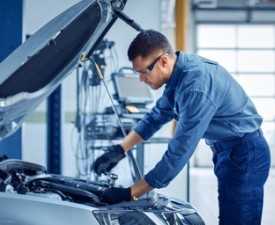Description
Course Name: Diploma in Automotive Service Technician(Four Wheller)
Course Id: DAST/Q0001.
Education Qualification: 10th Class.
Duration: 370 Hrs.
How You will Get Diploma Certificate:
Step 1- Select your Course for Certification.
Step 2- Click on Enroll Now.
Step 3- Proceed to Enroll Now.
Step 4- Fill Your Billing Details and Proceed to Pay.
Step 5- You Will be Redirected to Payment Gateway, Pay Course and Exam Fee by Following Options.
Card(Debit/Credit), Wallet, Paytm, Net banking, UPI and Google pay.
Step 6- After Payment You will receive Study Material on your email id.
Step 7- After Completion of Course Study give Online Examination.
Step 8- After Online Examination you will get Diploma Certificate soft copy(Scan Copy) and Hard Copy(Original With Seal and Sign).
Step 9- After Certification you will receive Prospect Job Opportunities as per your Interest Area.
Online Examination Detail:
- Duration- 120 minutes.
- No. of Questions- 60. (Multiple Choice Questions).
- 10 Questions from each module, each carry 10 marks.
- Maximum Marks- 600, Passing Marks- 40%.
- There is no negative marking in this module.
| How Students will be Graded: | ||
| S.No. | Marks | Grade |
| 1 | 91-100 | O (Outstanding) |
| 2 | 81-90 | A (Excellent) |
| 3 | 71-80 | A (Very Good) |
| 4 | 61-70 | B (Good) |
| 5 | 51-60 | C (Average) |
| 6 | 41-50 | P (Pass) |
| 7 | 0-40 | F (Fail) |
Benefits of Certification:
- Government Authorized Assessment Agency Certification.
- Certificate Valid for Lifetime.
- Lifetime Verification of Certificate.
- Free Job Assistance as per your Interest Area.
Syllabus
Diploma in Automotive Service Technician (Four Wheeler)
Fundamentals of Four – Wheeler
Introduction, Learning outcome, General information, General Training Plan, Examination & Pass regulation, Assessable Outcome, Assessable outcome with assessment criteria, Syllabus content of core skills, General information, Infrastructure, Understand and practice soft skills, working with Computer and communicate with required clarity, Demonstrate knowledge of concept and principles of basic arithmetic calculation, co-ordinate system and apply knowledge of specific area to perform practical operations.
Working of Four Wheeler Engine
Strength of Materials, Fluid Mechanics and Machinery, Engineering Thermodynamics, Manufacturing Methods, Mathematics, Strength of Materials Laboratory, Fluid Mechanics and Machinery Laboratory, Manufacturing Process Laboratory, Graphics Laboratory, Engineering Analysis and Numerical Methods, Heat Transfer and Combustion, Automotive Petrol Engines, Theory of Machines, Design of Machine Elements, Measurements and Instrumentation.
Four Wheeler Engine System
What is IC engines and components of IC engine, IC engine terminology, classification of IC engines, comparison of Two stroke &four stroke engines, Comparison between SI & CI engines, valve and port timing diagram, Working cycles-Otto, Diesel and Dual cycle, problem solving, Fuel- structure & composition of IC engine fuel, properties of SI and CI engine fuel, fuel rating, Fuel additives and non-petroleum fuels (alternative fuels), Fuel air requirement for ideal normal operation, maximum power & quick acceleration.
Four Wheeler Engine Support System
Introduction to the role of Automotive Engine Repair Technician, Perform service and repair of engine/related mechanical aggregates in a vehicle, State the importance of using appropriate colour dustbins for different types of waste, Discuss the common sources of pollution and ways to minimize it, Explain the organizational structure for communicating with colleagues, seniors and others, Explain the importance of respecting personal space of colleagues and customers.
Electrical System in Four Wheeler
Construction, working, elements, types, materials used. Electrolyte and its strength, effect of added plate area and temperature, rating capacity, efficiency, temperature characteristics, terminal voltages, charging and discharging, Battery Testing, Battery Charging, Battery Defects, Alkaling Batteries, Lithium ion Battery, Circuits, function and various components, dynamo and alternator, types, construction, working, advantages and disadvantages of dynamo and alternators, drives cut out relay.
Industrial Visit / Training
Occupational Health and Hazards, Safety at Workplace, Accident Prevention Techniques, Safety Management System and Law, Industrial visit and project report, Industrial visits and project report, Expertise Available, Personal Protective Equipment’s: Need, selection, supply, use, care and Maintenance, Personal protective devices for head, ear, face, eye, foot, knee and body protection, Respiratory personal protective devices, Training maintenance, precaution and care of PPE, Detection equipment.

